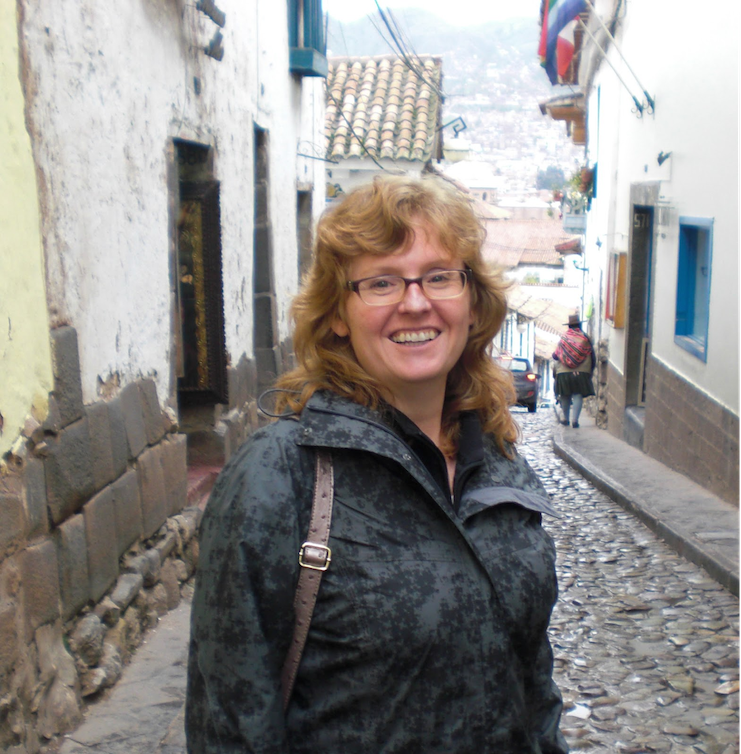…stop taking rejection personally and understand publication is a numbers game.
Teacher-librarian, with a passion for creative expression, Maaja Wentz is a serial fiction enthusiast and prize-winning author. In addition to writing novels on Wattpad, she writes short stories, kids' books, and articles. Her first novel, Feeding Frenzy: Curse of the Necromancer, earned a Watty Award.
Lyndi: As a teacher with a passion for creative expression, how do you provide opportunities for students to express themselves and what are the benefits of them doing so?
Maaja: I run a writing club for kids in November to coincide with National Novel Writing Month. In our library, it's a friendly competition which pits grade against grade to reach the highest word count. Kids like writing on computers and many use shared documents to collaborate with friends, adding images and words in real time. It's a joy to see so many little boys and girls excited about writing. The exciting and competitive nature of Writing Club appeals to a wide range of kids, and because I never read, revise, or judge their work, they do it for fun.
Once a year, I run the school Book Fair, which generates buzz around reading. I write and stage a skit with the library helpers to start the kickoff assembly. This past year, we held an online book fair which was less successful.
Have you ever read a story book with a recording? During the first lockdown, I missed my students and so wrote a kids' book. Marina Royale starts the Saltwater Spy Series about a tiny hermit crab and wannabe spy. So far there are two books, plus a free activity book. The YouTube video features a split screen where I read the story aloud on one side, and show the text opposite, so children can read along at home.
When kids come to the library and ask if I have "really written books," they are learning by example. If you want to do something, do it. I'm too shy to promote my own books in the library and won't put them on the shelves myself, but our Vice Principal displays them in his office for kids to read. What a nice guy.
Lyndi: Where did the idea to write 52 short stories in 52 weeks come from and how did that play out?
Maaja:
To aspiring writers, Ray Bradbury said:
"If you can write one short story a week—it doesn’t matter what the quality is to start, but at least you’re practicing, and at the end of the year you have 52 short stories, and I defy you to write 52 bad ones. Can’t be done."
I took "The Great Challenge," course with Dean Wesley Smith, who advocates following the Ray Bradbury method, writing for fun, and writing without an outline. The course came along when I was having trouble revising my second novel and I thought, why not? At the end of a year, I'll be a better writer, and revising the novel will be easy.
Would I recommend writing one story per week to aspiring writers? Absolutely, but manuscripts are only useful if you find time to publish or submit the stories, which brings me to the Heinlein Rules.
Robert A. Heinlein's oft-quoted business rules for science fiction writers say: You must write, finish, submit, and keep submitting until your story sells. While a story is on the market, write something else. Common sense goals, but challenging for beginners. It takes a while for most writers to stop taking rejection personally and understand publication is a numbers game. Even if your story is of publishable quality, the chances it will reach the right editor at the right time for the right publication (even after researching the markets) can still be slim. You have to keep your work circulating, and build up a stockpile of work to succeed.
Lyndi: Who influences you most in terms of craft and productivity?
Maaja: James Clear, Cal Newport, Margaret Atwood, Dean Wesley Smith, Virginia Woolf, Austin Kleon, and my grade eight teacher, Mr. Potter.
From James Clear, I learned the habit of writing daily and tracking my progress. Margaret Atwood, Virgina Woolf and William Gibson dazzle with technique. Cal Newport preached a return to "deep work" in a world of distractions. Dean Wesley Smith asserted the only reason to write is for fun, ignoring the market, the naysayers, and even critique groups. He believes the writer is often the worst person to judge a story. Instead, writers should send it out and let the market decide.
As a kid, perfectionism could paralyze me. My wonderful teacher, Mr. Potter, assigned so much work it forced us to get things done without futzing about. He was no nonsense, full of energy, and taught with empathy.
Lyndi: In the paranormal thriller, Cliffhanger Castle, collaborating authors display their unique styles as they get heroes in and out of peril. What was your experience of writing collaboratively like?
Maaja: It started with a visit to the Guild Inn Grounds in Toronto, an abandoned hotel with fantastic gardens dotted with recovered statues and architectural details from demolished buildings. It's a historic site, with a settler's cabin on the grounds which run up to the bluffs overlooking Lake Ontario. At different times it hosted an artist's colony and a military barracks. Incidentally, a friend of the family founded a summer drama series at the Greek Theatre on the grounds.
It was fun collaborating with six different Wattpad friends who wrote individual chapters ending in a cliffhanger for the next writer to resolve in their own style.
Writing challenges and collaboration appeal to me. This summer I tried a 24-hour anthology writing challenge with a local Toronto writers' group. We had to write and help edit each other's stories for publication in 24 hours. Notes and research were allowed, but all writing and editing had to be done in a day. It was great fun and resulted in a new Sherlock Holmes story.
Lyndi: Where are you going next with your writing?
Maaja: In July, I joined Medium, where I'm contributing articles, fiction and poetry. Medium is a blogging platform which reaches 100 million readers per month. Popular topics include finance, health, investing, entrepreneurship, and politics. I'm using it to connect with writers and hone my journalistic skills. Learning new things drives me. This summer I took a six-week editing course and I'm doing a course on web writing.
Lyndi: What marketing strategies have you found effective for promoting your writing?
Maaja: The sequel to Feeding Frenzy is a mystery cold case with family conflict, witches, rival magic factions, and the looming threat of dragons. Once it's published, I'll write the next, hoping to reach new readers with each new book. I also write and submit short stories to magazines for the same reason.
I'm always looking for new readers who might like one of the free stories I give to my mailing list subscribers. I add mystery, thriller, and paranormal elements in my work, but keep separate lists for mystery/thriller versus stories that include fantasy elements. My third list is for fans of my kids' stories. Interested readers can find free stories via my website. Each month, I send out a newsletter that includes free stories by other indie authors. They share my stories and I share theirs, giving readers a chance to discover new writers via free ebooks.
My writing life has come full circle as an indie. When I was a kid, stapling together my own books, writing and illustrating them, I never imagined one day becoming an indie author who would make books from scratch in the digital realm.
Maaja Wentz concocts magical worlds and mysteries in a variety of genres. Her first novel, Feeding Frenzy: Curse of the Necromancer, was serialized on Wattpad where it won a Watty award. For a challenge, Maaja wrote 52 short stories in 52 weeks. Her unique locked-door mystery, "Inside of a Dog," appeared in Ellery Queen Mystery Magazine. "You," won a short story prize in the national Norma Epstein Foundation competition for Creative Writing. She is a teacher-librarian in Toronto, Ontario. www.maajawentz.com



